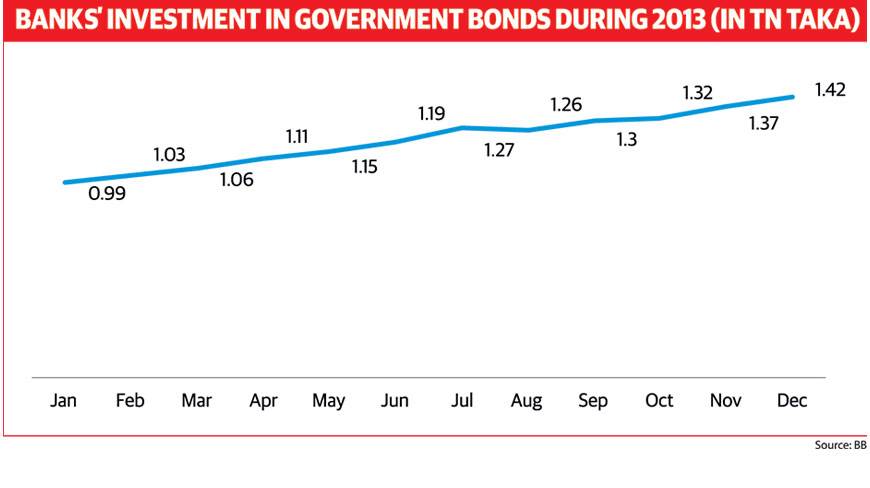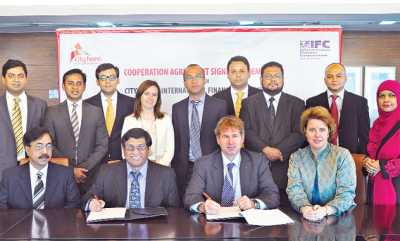Bad loan writing off norms set for micro lenders
The microcredit regulator has for the first time formulated a guideline on writing off bad loans for micro-finance institutions.
Presently, there is no specific guideline on writing off classified or bad loan for MFIs having loan recovery record of around 90%.
The Microcredit Regulatory Authority (MRA) recently formulated a uniform guideline to bring discipline in the credit disbursement system.
Under the new guideline, classified loans that remain as bad loans for two years and are kept as 100% provisioning will be eligible for writing off.
The oldest classified loan will have to be written off first and, if any fake or unidentified loan is found, the concerned institutions must inform the regulator before writing it off.
Approval of the board of directors of the institution requires before writing off the loan, and such writing off will have to be made either on June 30 or December 31 each year.
Even after writing off a loan, the MFIs will have to continue making efforts to realise the loan and after such loan realisation, they have to be shown as earnings.
Md Shazzad Hossain, a director of MRA, said microcredit institutions have a recovery record of more than 90% in Bangladesh. “From this point of view, that’s not important to make a write off guideline.”
What the MRA has been trying to do is to put the industry on the right track since its inception, he said.
“New rules and regulations is a step forward to develop the industry in accordance with the international standards.”
Since its inception in 2006, the MRA has been continuously making efforts for creating an enabling environment in the microfinance industry for its sustainable development by formulating new rules and regulations.
Bangladesh has become the first country in the world to establish a separate entity, MRA, under a separate act to license, monitor and oversee the MFIs, as microfinance had been a private sector initiative all along and flourished without any formal regulatory entity from the government in most parts of the world.
Though Bangladesh has been the pioneer of microcredit, it lagged behind some countries in enacting a regulatory framework for this sector. Over the years, it has brought a number of changes in its rules and regulations.
Presently, there are 732 MFIs or NGOs under MRA operating in the country. Of the MFIs, only five are very large, 21 large, 115 medium, and rest are small ones.
The country’s first microfinance institution Bangladesh Rural Advancement Committee (BRAC) was established in 1972 through which microfinance activities had started in Bangladesh.
News:Dhaka Tribune/18-Feb-2014
Banks divert investment to risk-free government securities

The investment of banks in the government securities increased by 43% year-on-year in January this year as private sector entrepreneurs were reluctant to take loan due to sluggish business climate.
It increased to Tk141,942 crore in January 2014 over the last 12-month period from Tk99,000 crore in January last year, according to latest Bangladesh Bank statistics.
During the period, private sector credit growth increased by 13% to Tk783,709 crore, which is much less than the monetary policy target.
The country’s commercial banks are awash with excess liquidity due to less than expected investment amid lower credit demand with almost all kinds of business expansion remained suspended amid political uncertainty ahead of the general election held on January 5.
As a result, banks increased their investment in the government securities instead of keeping the money idle, said a Bangladesh Bank senior executive.
“Bangladesh Bank is selling the government securities keeping in mind whether the government would face interest burden,” Deputy Governor SK Sur Chowdhury told the Dhaka Tribune yesterday.
Excess money after maintaining statutory liquidity ratio (SLR) in the banking system as of January 9 this year stood at Tk89,337 crore, including Tk79,000 crore or 88.5% remained invested in the government securities.
“The banks are not bound to invest in government securities, but they invested here for risk-free return,” said a senior executive of a private bank. “The amount of investment increased when the banks considered it risky to invest in private sector due to political turmoil.”
The banks get around 10% interests on investment in government securities against an average of above 15% they could get through lending otherwise.
“Lending to private sector has the risk of becoming classified, but there is no risk of investment in government securities,” Bangladesh Bank Executive Director Mahfuzur Rahman told the Dhaka Tribune.
Banks can lend up to 81% of their liquidity. It was about 56% in case of the state-owned banks till December 13 last while about 78% for private commercial banks.
The investment in government securities in the first quarter of last year increased by 7% to Tk100,000 crore when private sector credit posted negative growth by 0.15% to Tk425,000 crore.
The quarterly credit growth in the government securities increased by 6.45% to Tk118,000 crore in June last year, followed by 2% to Tk130,000 crore in September and 7.1% to Tk141,000 in December while private sector credit growth increased by 2.7% to Tk446,000 crore, 1% to Tk442,000 crore and 2.6% to Tk 463,000 crore respectively.
The excess liquidity increased by Tk29,000 crore or 48% last year to stand at Tk89,000 crore in January 2014 from Tk60,000 crore in the same month last year.
News:Dhaka Tribune/18-Feb-2014
Atiur hopes non-performing loans to stay moderate
We have to closely monitor the banks that have taken the opportunity of loan rescheduling, so those loans won’t turn into classified again
Bangladesh Bank Governor Dr. Atiur Rahman yesterday hoped that the non-performing loans (NPL) of the scheduled banks would remain under a moderate level in the balance-sheet of December 2013 just because of flexible policy undertaken by the central bank.
He was addressing the General Managers Conference held at the central bank headquarters.
To recover the financial health of the banks, International Monetary Fund (IMF) has long been putting pressure on the central bank to reduce the NPL.
Addressing the conference BB governor said, “We have to closely monitor the banks that have taken the opportunity of loan rescheduling, so those loans won’t turn into classified again.”
“As the rate of classified loans in the banking sector increased slightly 12.79% in September, 2013 after adopting internationally best practices in loan classifying and provisioning, the central bank has relaxed the rules of loan-rescheduling, so the NPL rate reduces in the balance sheet.’’
Bangladesh Bank had earlier asked the commercial banks issuing a circular in December, 2013, to offer privileges to small and medium enterprises (SMEs), agricultures and other productive sectors in case of loan rescheduling.
It also asked the banks and financial institutions to consider the impact of political unrest on various productive sectors and business to receive down payment and allow loan rescheduling.
The banks and financial institutions should, however, need to obtain permission from their respective authorities and no objection from the BB before allowing anyone the extended-time for the loan rescheduling.
Although the BB circular is applicable to the affected businessmen only, on the contrary, the central bank is also allegedly allowing all the non-compliance rescheduling cases. As a result, many businessmen are taking the chance to reschedule their loans despite not being affected.
Country’s commercial banks started loan rescheduling comprehensively in order to reduce the non-performing loan (NPL) amount in the balance sheet of the year end 2013.
Bangladesh Bank has so far approved over 300 such loan rescheduling cases which don’t comply with the loan rescheduling requirements. Among the loan-rescheduling recipients, Beximco Group got the highest privileges with around Tk2,000 crore, according to the Bangladesh Bank data.
Exchange rate remained stable in the interbank call money market and in foreign money market due to the close monitoring by the central bank, said the governor at the conference.
“However, inflation remained higher in last three-month because of supply disruption amid political unrest.”
News:Dhaka tribune/17-Feb-2014City Bank signs deal with IFC

City Bank has recently signed a cooperation agreement with International Finance Corporation (IFC) as part of IFC’s ‘Access to Finance Advisory Service’ programme aimed at promoting sustainable private sector investment in developing countries.
Under the cooperation agreement, IFC has agreed to contribute to City Bank’s initiatives to automate the Loan Origination and Collection Management processes as well as the development of the skill resources and assisting in its capacity building programme in the SME and retail business areas of the bank, said a press release.
The agreement was signed by Sohail R K Hussain, Managing Director and CEO on behalf of City Bank and Kyle F Kelhofer, Country Manager, Bangladesh, Bhutan and Nepal of IFC at City Bank’s Head Office in Dhaka.
Citi partners with Sonali Bank on Corporate Tax e-Payment
Citibank, N.A., Bangladesh Monday signed an agreement with Sonali Bank Limited on “Corporate Tax e-Payment” solution.
The National Board of Revenue (NBR) is currently in the process of developing a system where corporate taxpayers will be able to pay tax online.
With launching of the system, Citi’s clients, under the deal, will be benefited for being able to pay taxes online, said a press release.
The signing ceremony was attended by senior officials from Sonali Bank Limited, The National Board of Revenue, Bangladesh Bank, International Finance Corporation, IT Consultants Ltd. and Citibank N.A.
Pradip Kumar Dutta, Managing Director and Chief Executive Officer (CEO), Sonali Bank Limited, reiterated the role of Sonali Bank in the proposed Tax e-Payment mechanism for institutional customers and stressed the effectiveness of this digitised method in lieu of the prevailing manual tax payment process.
Rashed Maqsood, Managing Director and Citi Country Officer for Bangladesh, highlighted Citi’s commitment to deliver world-class solutions for corporate clients.
This partnership with NBR and Sonali Bank will pave the way towards an electronic era in corporate tax, and further strengthen Citi’s continued leadership in the country’s electronic banking space.



